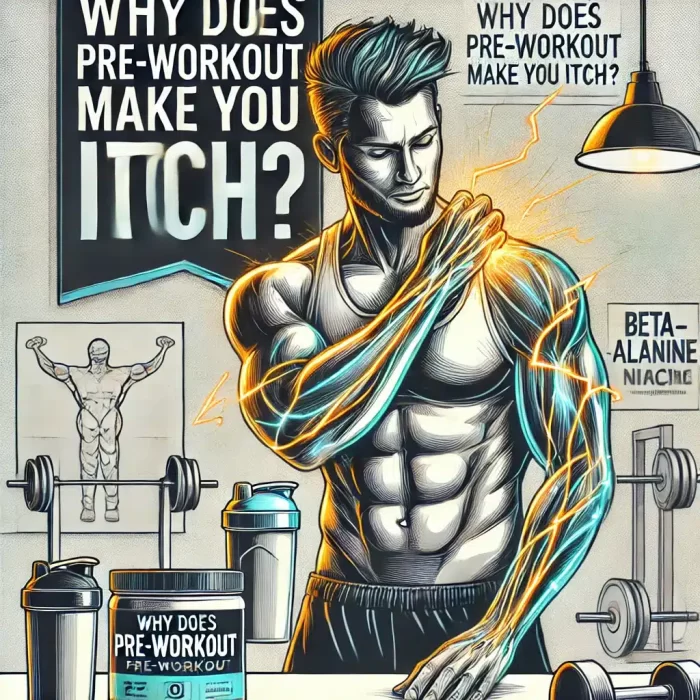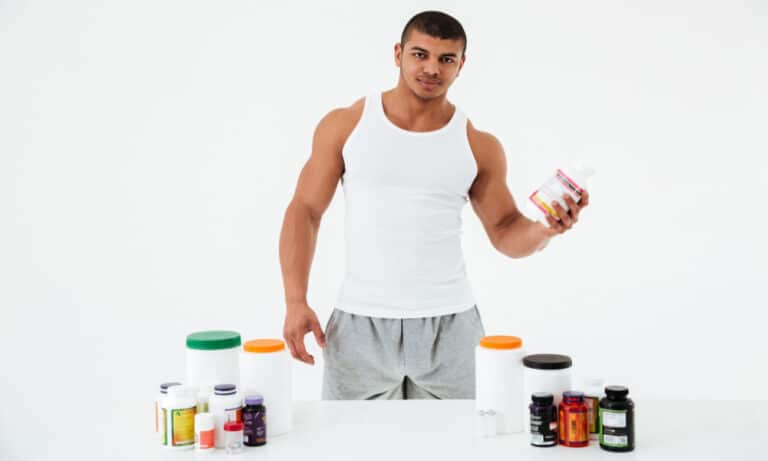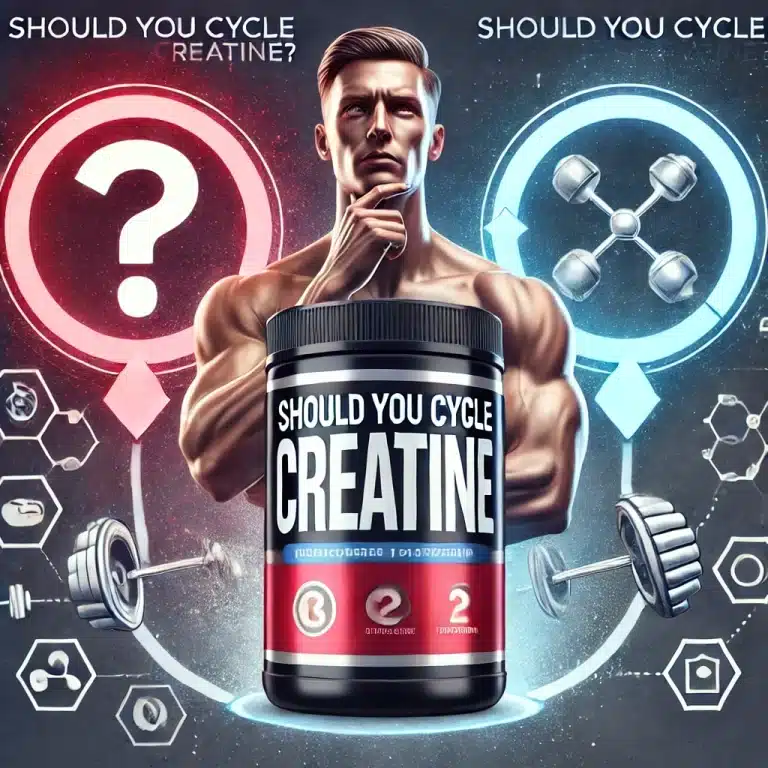Why Does Pre-Workout Make You Itch?
Leg day came around. I was dragging, so I could remember it exactly, like dragging. It was one of those mornings when your body felt three steps behind your head. I finally tried the new pre-workout powder kept in my gym bag. I mixed it, chugged it, and in minutes, boom, the itching started, first in my ears, then my neck, then my arms.
I honestly felt I was having an allergic response. But the man staring over from the squat rack smiled and said, “Yo, that’s just the beta-alanine kickin’ in. You’re great.”
That introduced me to pre-workout itching.
You are not alone if you have ever experienced that tingly, prickly, almost electrifying skin sensation following a pre-workout downing. Commonly occurring, believe it or not, it is not dangerous. Still, many individuals find it perplexing: Why does pre-workout make you itch?
This post will dissect exactly what generates that sensation, why it occurs, whether your pre-workout is effective and whether you should be worried about it. Keep reading then, if you have been yearning for the truth (pun 100% intended).
The Primary Culprit: Beta-Alanine
This tingling sensation, which is a side effect of beta-alanine, a key component in many pre-workout formulations, is also known as paraesthesia.
Beta-alanine is a non-essential amino acid that generates carnosine in muscles, therefore enhancing muscular endurance. A buffer called carnosine stops lactic acid from buffering up, so enabling prolonged working times at great intensity.
How Beta-Alanine Causes Itching?
Beta-alanine stimulates several nerve receptors found right beneath the surface of the skin. Responsible for the tingling or itching feeling are these Mas-related G-protein-coupled receptors (MRGPRs). Beta-alanine hooks these receptors to produce an immediate increase in sensory neuron firing. Usually described as a tingling or itchy sensation, this reaction generates that pins-and-needles feeling.
Fascinating is that this impact is not universal. Others suffer greatly; others rarely feel anything at all, even on stronger dosages. In my experience, the strength of the sensation can be influenced by factors including body weight, general sensitivity, and stomach contents as well as by diet. For instance, the beta-alanine itching may be more noticeable when consumed alone than after a meal or protein drink.
The fact that this reaction is mild and typically passes in 30 to an hour is welcome news. For some who are new to pre-workouts or lack this sensation, it can be a little shocking and even disruptive. Clients have reported that it feels like “ants crawling on their skin,” which sounds frightening at first but is controllable with knowledge and sensible application.
Why Some People Feel It More Than Others?
People have very different sensitivity to the effects of beta-alanine. Those with more sensitive nerves or those more sensitive to stimulants seem to experience the tingling more. Furthermore highly important is the dosage. Usually occurring at doses higher than 2 grams of beta-alanine, it is likely that most pre-workout formulations include 2 to 5 grams of it.
Still, l another factor is how often you use beta-alanine. As your body adjusts, the tingling sensation usually disappears over time with ongoing use. This is so because less and less is needed for raised circulation concentrations of beta-alanine at the same time as your muscles are more saturated with carnosine. Clients who consistently take a beta-alanine supplement seem to have less tingling sensations with time.
The Role of Timing and Delivery:
Furthermore affecting the degree of the itching is your beta-alanine intake. Fast-acting beta-alanine powders or drinks can provide a rapid surge of the molecule into your system, therefore enhancing the experience. Conversely, less tingling is often produced by sustained-release formulations, which are meant to deliver beta-alanine more gradually. Clients who find the sensation distracting have found far better experiences when I have advised these.
Understanding Paresthesia in Context:
Beta-Alanine One of the most misinterpreted sensations in the fitness industry is the tingling one beta-alanine causes, also known as paraesthesia Obviously, this reaction is not an allergic or other negative one. Rather, some athletes even appreciate this side effect as a sign that their pre-workout starts to kick in. Although at first it may seem unusual, knowing that it is temporary and safe can help one to manage the experience much more easily.
Discover beta-alanine and how it affects the body, but most importantly, find out what causes beta-alanine itching and how you could prevent it. There are methods to take beta-alanine and prevent the performance-impairing tingles whether your preferred method is something else totally, change over to a sustained-release product, try to toy around with the dosing, or time.
Why Beta-Alanine Is Included in Pre-Workouts?
For all they are irritating, pre-workout pills include beta-alanine for good reasons. is rather important for sporting performance. Working exercise produces hydrogen ions in your muscles that lower pH and cause a burning sensation alerting you to tiredness. Beta-alanine helps create carnosine to neutralize these hydrogen ions, therefore reducing muscular tiredness and enabling you to go harder and farther through your exercise.
“For anyone who practices HIIT, weightlifting, or sprints, the advantages of beta-alanine could transform their life. Studies have shown that continuous beta-alanine intake improves performance in 1 to 4-minute activities, areas typically difficult in the gym.
Dosage Matters:
Usually to beta-alanine, the degree of the itching is dose-dependent. Based on studies, higher doses, greater than two grams, are also more likely to cause paraesthesia. Many pre-workouts including between 2 and 5 grammes of beta-alanine cause excoriation, or itching. If you are sensitive, even a tiny dosage could cause the sensation.
Remember too that beta-alanine operates in concert. Therefore, rather than having to take high quantities just before a training session, consistent daily supplements will maximize their exercise-enhancing effects. Surprisingly, spreading my beta-alanine into smaller amounts throughout the day significantly reduces this itching and yet offers benefits for endurance.
Other Ingredients That May Contribute to Itching
The primary cause is beta-alanine; several other components in pre-workout might also produce tingling or itching. Here is a closer inspection of those components and their possible effects on you:
- Niacin (Vitamin B3):
- Oh, have you ever pre-worked and felt your skin quiver and warm?
- Still, it’s probably from niacin.
- Pre-workouts include this often-used substance to heat the body and boost blood flow and energy metabolism. Large doses of it set up a reaction known as a “niacin flush.” Especially on your face and upper torso, that flush is a warm, prickles sensation that causes redness and skin itching. It is transient and brought on by dilating blood vessels and more blood reaching the skin. I put up with this; for some, it can be too much. Should that prove problematic, you might try a lower-niacin pre-workout.
- Citrulline Malate:
- Additionally quite popular in the pre-workout ingredient category is citrulline malate. It’s included since it boosts nitric oxide synthesis, enhancing blood flow and reducing muscular tiredness. Like niacin and beta-alanine, citrulline malate is somewhat tingly or itchy in some sensitive people but is far less prevalent with this substance. Although this impact is infrequent and usually quite modest, it’s something to keep in mind should you be trying to pinpoint the cause of discomfort.
- Artificial Additives:
- Some pre-workout artificial colors, flavors, or sweeteners could irritate sensitive people’s skin or trigger allergies. For example, I have had customers complain of redness or itching following the consumption of a supplement loaded with chemical ingredients. If you have already ruled beta-alanine and niacin as the offenders, it’s good to review the ingredient list even though these reactions are rarer.
Is the Itch Dangerous?

Based on my experience and studies, pre-workout pills usually induce a minor itching that passes over.
Usually, the pre-workout impact lasts thirty minutes to one hour after you have taken your supplement. Though it can be unpleasant, usually speaking, it is not something to worry about.
Exceptions do exist, though. You might be suffering an allergic response if you experience hives, redness other allergic reaction signs, or extreme itching. I have seen [some persons ignoring these indications and subsequently keeping on a supplement] which aggravates their conditions. Should that occur, you should immediately cease using the product and see a medical practitioner.
Is the itching interfering with your exercise or focus? Another criterion is I have even experienced spells of itching that were so irritating; that they took my attention off the intensity of my workout session. If so, you could find it beneficial to review the techniques below to either reduce or eradicate the feeling.
Though most people’s itching is not dangerous, understanding your body’s reaction and modifying your behavior will help you stay comfortable and focused on your exercise goals.
How to Reduce or Avoid the Itch?
Should you enjoy the advantages of your pre-workout but find the itchy sensation intolerable, here are some suggestions to help:
1. Adjust the Dosage
- Dividing your dosage into smaller amounts spread across the day is one of the best ways I have discovered to help with itching. Take one gram four times over the day instead of your four grams of beta-alanine all at once. This considerably lessens the intensity of the itching and holds the beta-alanine levels in your system more consistently.
2. Opt for a Pre-Workout Without Beta-Alanine
- Look for one without beta-alanine if you are sensitive to this component and the tingling is too great to manage. There are tonnes of energy and focus-boosting foods sans beta-alanine. These can be excellent choices if you want to enjoy the advantages of a pre-workout but without the adverse effects.
3. Try Sustained-Release Beta-Alanine
- I have responded nicely to beta-alanine sustained-release formulations. These kinds are meant to deliver the components into your system more slowly, so reducing the tingling or irritating feeling. This is a great choice if you wish to keep beta-alanine the mainstay of your mixture.
4. Be Mindful of Niacin Content
- I have responded nicely to beta-alanine sustained-release formulations. These kinds are meant to deliver the components into your system more slowly, so reducing the tingling or irritating feeling. This is a great choice if you wish to keep beta-alanine the mainstay of your mixture.
5. Stay Hydrated
- Not only does keeping good hydration before and during your exercise aid with optimal performance, but it also helps reduce part of the itching sensation. A straightforward, efficient approach to avoid unpleasantness? Keep hydrated; dehydration can make skin more sensitive.
6. Experiment with Timing
- If so, trying to get your pre-workout closer to your workout schedule might assist. I scarcely notice the itching at all when I try to finish my exercises. Get the time perfect, and the least of your problems should be this sensation.
7. Ease into It
- New to pre-workouts should start at a lesser dosage so the body has time to adjust. Eventually, the itching will become tolerable and you will profit without suffering.
Debunking Myths About Pre-Workout Itching:
The itchy feeling brought on by pre-workout pills is surrounded by various misunderstandings. Let’s go into great length on these legends:
Myth 1: The Itch Means the Pre-Workout Is Working
Among the major misunderstandings I have come across is this one. Usually, users of pre-workout supplements understand the tingling or itchy sensation of beta-alanine as proof their supplement is functioning.
The itching is only a side effect of beta-alanine activating the nerve receptors in your skin. It has nothing to do with how much the supplement you are using is enhancing your performance, concentration, or energy level. I attended classes when the itching was a doozy but the energy increase was nonexistent and vice versa. Two different things are effectiveness and itching.
Myth 2: The Itch Is Harmful
Being a dietitian, I often wonder whether the itching sensation is fatal. For the great majority of people, it is transient and benign. You establish that paraesthesia brought on by beta-alanine is neither harmful nor allergenic.
Having said that, significant itching accompanied by other symptoms like hives or swelling could potentially point to an allergy to another component in the supplement. Under these circumstances, one should stop using the product and see a doctor. Remaining safe depends on knowing how your body reacts to specific drugs and being aware of any unusual side effects.
Myth 3: Everyone Experiences the Itch
Not everyone will have the tingling or itchy sensation, even at high beta-alanine dosages. Also displaying great individual variety is the sensitivity to this side effect. In my employment, I have seen people who take pre-workout and feel nothing at all and others who claim strong tingling with smaller dosages.
Your itch’s power also comes from specifics including body weight, tolerance, and particular nerve sensitivity. Not experiencing this side effect does not mean your pre-workout isn’t functioning; it simply indicates different beta-alanine metabolism.
Should You Stop Taking Pre-Workout If It Makes You Itch?
If pre-workout causes you itch, your decision to keep on pre-workout truly depends on the degree of annoyance you experience. Usually there’s no reason to quit if the itching is not particularly severe and it isn’t stopping your exercise. For many of us, it is tolerable, that is, somewhat unpleasant, a feeling I would equate with what happens when your sock falls in your shoe (should you wear socks). For some, the performance-boosting advantages of the supplement outweigh any slight trade-off.
You should reassess your approach, though, if the itching is distracting or feels strong. Starting with the approaches I discussed earlier, such as modifying the dosage or following a non-beta-alanine pre-workout, always makes sense. Little changes like this have a great impact.
Moreover, one should be alert about other probable signs. Stop using the supplement right once and get medical advice if the itching is related to redness, swelling, or hives. Not a typical side effect, that could be evidence of an allergic reaction.
In my modest view as a dietitian, listening to your body is the answer. Supplements should improve rather than interfere with your exercise. When in doubt try different approaches but if still it’s unbearable for what seems no reason, this may be a good indicator to try whatever you haven’t yet or contact a sports nutritionist to deduct then do what is necessary. Brands have been known to sit well with some and not others. Although there is no one solution, you should probably find something that fits you by some trial and error.
So, Why Does Pre-Workout Make You Itch?
Why then do pre-workouts make you itch? It largely relates to beta-alanine, an amino acid that raises carnosine levels in your muscles therefore enhancing endurance. Paraesthesia, the itching, is simply your nerves responding to a strong dose.
It’s transient, benign, and in some strange sense motivating. Some lifters find it a cue that go-time is approaching. Others find it simply a side effect that irritates them.
The good news is that Your inclination will determine whether you want to turn it up or down. Low doses, slow-release formulations, or split meals will enable you to benefit from beta-alanine without feeling as though you rubbed your face in fiberglass.
The itching is strange; but, now you know why it occurs and how to deal with it. Thus, try not to panic next time it starts. Accept the twitching. Alternatively not. In either case, it is your call.
Go crush your workout right now.






